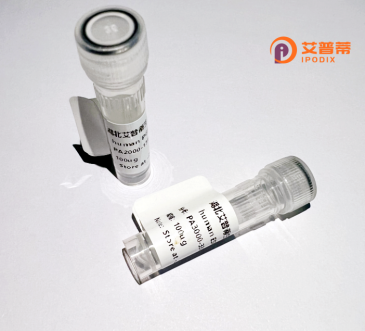
| 纯度 | >90%SDS-PAGE. |
| 种属 | Human |
| 靶点 | KRT76 |
| Uniprot No | Q01546 |
| 内毒素 | < 0.01EU/μg |
| 表达宿主 | E.coli |
| 表达区间 | 1-638aa |
| 活性数据 | MNRQVCKKSFSGRSQGFSGRSAVVSGSSRMSCVARSGGAGGGACGFRSGAGSFGSRSLYNLGSNKSISISVAAGSSRAGGFGGGRSSCGFAGGYGGGFGGSYGGGFGGGRGVGSGFGGAGGFGGAGGFGGPGVFGGPGSFGGPGGFGPGGFPGGIQEVIVNQSLLQPLNVEIDPQIGQVKAQEREQIKTLNNKFASFIDKVRFLEQQNKVLETKWELLQQQTTGSGPSSLEPCFESYISFLCKQLDSLLGERGNLEGELKSMQDLVEDFKKKYEDEINKRTAAENEFVGLKKDVDAAFMNKVELQAKVDSLTDEVSFLRTLYEMELSQMQSHASDTSVVLSMDNNRCLDLGSIIAEVRTQYEEIAQRSKSEAEALYQTKLGELQTTAGRHGDDLRNTKSEIMELNRMIQRLRAEIENVKKQNANLQTAIAEAEQRGEMALKDANAKLQDLQTALQKAKDDLARLLRDYQELMNVKLALDVEIATYRKLLEGEECRMSGECQSAVCISVVSNVTSTSGSSGSSRGVFGGVSGSGSGGYKGGSSSSSSSGYGVSGGSGSGYGGVSSGSTGGRGSSGSYQSSSSGSRLGGAGSISVSHSGMGSSSGSIQTSGGSGYKSGGGGSTSIRFSQTTSSSQHSSTK |
| 分子量 | 92.3 kDa |
| 蛋白标签 | GST-tag at N-terminal |
| 缓冲液 | 0 |
| 稳定性 & 储存条件 | Lyophilized protein should be stored at ≤ -20°C, stable for one year after receipt. Reconstituted protein solution can be stored at 2-8°C for 2-7 days. Aliquots of reconstituted samples are stable at ≤ -20°C for 3 months. |
| 复溶 | Always centrifuge tubes before opening.Do not mix by vortex or pipetting. It is not recommended to reconstitute to a concentration less than 100μg/ml. Dissolve the lyophilized protein in distilled water. Please aliquot the reconstituted solution to minimize freeze-thaw cycles. |
以下是关于重组人KRT76蛋白的3篇示例文献摘要,涵盖功能、表达方法及疾病关联研究:
---
**1. 文献名称**:*"Recombinant Human Keratin 76: Expression in Escherichia coli and Role in Epidermal Differentiation"*
**作者**:Zhang et al.
**摘要**:本研究成功在大肠杆菌系统中表达并纯化了重组人KRT76蛋白,验证其通过参与角化包膜形成调控皮肤屏障功能,为研究表皮分化机制提供工具。
---
**2. 文献名称**:*"KRT76 Reprogramming in Squamous Cell Carcinoma: Insights from Recombinant Protein-Based Assays"*
**作者**:Li & Wang
**摘要**:通过哺乳动物细胞表达重组KRT76.发现其在鳞状细胞癌中异常表达,可能与肿瘤细胞迁移及EGFR信号通路激活相关,提示其作为潜在治疗靶点。
---
**3. 文献名称**:*"Optimization of Recombinant KRT76 Production in Pichia pastoris for Structural Studies"*
**作者**:Gupta et al.
**摘要**:文章报道在毕赤酵母中优化KRT76重组表达,获得高纯度蛋白用于X射线晶体学分析,揭示其C端结构域在蛋白聚集体组装中的关键作用。
---
每项研究从不同角度探索KRT76的功能与应用,涵盖基础机制到疾病模型,为后续研究提供参考。实际文献建议通过PubMed或Google Scholar以关键词“recombinant KRT76”或“keratin 76 expression”进一步检索。
Keratins are a diverse family of structural proteins that form intermediate filaments in epithelial cells, playing critical roles in cell integrity, signaling, and stress response. The human KRT76 gene encodes keratin 76. a type II keratin expressed primarily in differentiated epithelial tissues, such as the skin, hair follicles, and mucosal surfaces. It is involved in maintaining tissue integrity, cell adhesion, and barrier function. Dysregulation of KRT76 has been linked to epithelial disorders, including skin fragility syndromes, inflammatory conditions, and certain cancers, highlighting its importance in both physiological and pathological contexts. Recombinant human KRT76 protein is produced via genetic engineering, often using bacterial or mammalian expression systems, to enable functional studies. Its purification typically involves affinity chromatography, ensuring high specificity and minimal contamination. Research applications include investigating keratin-mediated cell signaling, epithelial differentiation mechanisms, and disease pathogenesis. Additionally, recombinant KRT76 serves as a tool for developing diagnostic biomarkers or therapeutic strategies targeting keratin-related disorders. Recent studies also explore its potential role in wound healing and tissue regeneration. Despite progress, further work is needed to fully elucidate its interaction networks and regulatory pathways in health and disease.
×